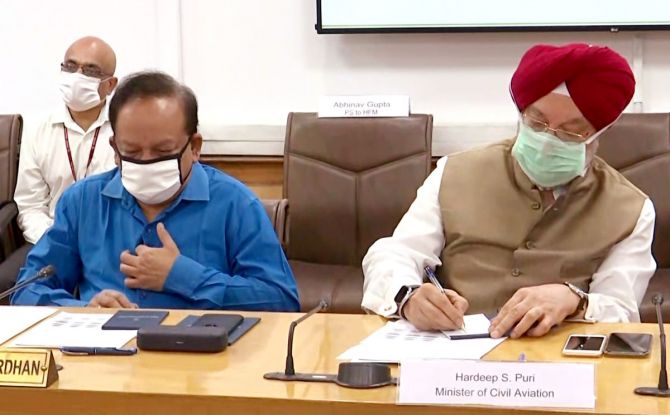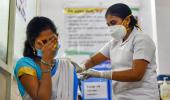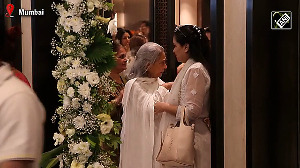Eleven committees were set up as early as March 29, just days after the first lockdown announced by Prime Minister Narendra Modi. All 11 were empowered groups set up by the ministry of home affairs.
While some of those committees may have lost relevance, others could have their use still, reports Nivedita Mookerji.

In a curious turn of events, an empowered group on vaccine administration for Covid-19 was set up recently, just days ahead of the nationwide vaccination rollout.
Those tracking the pandemic and the run-up to vaccines closely are asking why this panel has been constituted so late. But that’s only one of the many questions related to the novel coronavirus and the jab to keep the infection away.
Apart from the timing of the committee (coming so close to the vaccination start day), consider its nomenclature. Called the empowered group on vaccine administration, its name could be confusing because another such panel -- the national expert group on vaccine administration -- already exists.
To make things clear, the government has indicated that the core objective of the latest committee would be to ensure smooth implementation of the CO-WIN technology platform, which is meant to track vaccine inventory and delivery.
However, in addition, this group, headed by former chairman of the Telecom Regulatory Authority of India R S Sharma, can take decisions on logistical measures to enable a successful vaccination programme.
Incidentally, the national expert group on vaccine administration chaired by Niti Aayog member V K Paul also looks at logistics and infrastructure, among other things.
This is what the government statement said on August 12, 2020, after the first meeting of the Paul panel: “The expert group deliberated on conceptualisation and implementation mechanisms for creation of a digital infrastructure for inventory management and delivery mechanism of the vaccine, including tracking the vaccination process with particular focus on last mile delivery…. Available options in terms of delivery platforms, cold chain and associated infrastructure for rollout of Covid vaccination were also taken up.’’
Does that mean there could be a clash of tasks between the two panels?
Possibly pre-judging such a scenario, a linkage has been provided between the two groups -- both set up by the order of the Cabinet Secretariat. That is, Sharma has also been included in the national expert group that was constituted in August.
For ease of reference, the Paul panel, which has secretaries from external affairs, finance and health ministries, is being termed a policy group. The Sharma committee is more a technology enabler.
There have been plenty of committees before too ever since Covid arrived on the scene. Do those committees still meet in some form or the other?
Eleven committees were set up as early as March 29, just days after the first lockdown announced by Prime Minister Narendra Modi.
While some of those committees may have lost relevance, others could have their use still.
All 11 were empowered groups set up by the ministry of home affairs. These were groups for medical emergency management plan; availability of hospital, isolation and quarantine facility; ensuring availability of medical equipment such as PPE, masks, ventilators; augmenting human resources; facilitating supply chain and logistics management for food and medicine; coordinating with private sector for response-related issues; economic and welfare measures; information and public awareness; technology and data management; public grievances; and strategic issues relating to lockdown.
Despite so many groups and committees, there are questions and questions.
For example, why is the cost to the government for vaccination still a mystery?
Is it true that the government has been negotiating with the vaccine makers to lower the price quoted by them, and then what happened?
Will there be multiple vaccines in India in due course of time?
When will they be available in the market and at what price?
Also, what really is the plan to vaccinate factory workers and others who’ve been working in spite of all the odds?
Like frontline and health workers, the people who make the world go round for India Inc must be on the priority list too so that there’s no fresh setback to the economy.
During 2020, factories had to be shut time and again to follow safety protocols whenever Covid cases surfaced among workers. Inoculated workers would mean minimising disruptions in industries. For that, many companies would be willing to bear the cost, but the government has to hear out the business leaders on such plans.
The global narrative is that all steps must be taken to prevent a long Covid. Quick vaccination holds the key to shorten the pandemic and prevent the virus from mutating.
India must do what it takes to stay on that path, even if that means putting in place some critical groups and committees rather belatedly to set things right.
Once that happens, questions will find the right answers.











 © 2025
© 2025